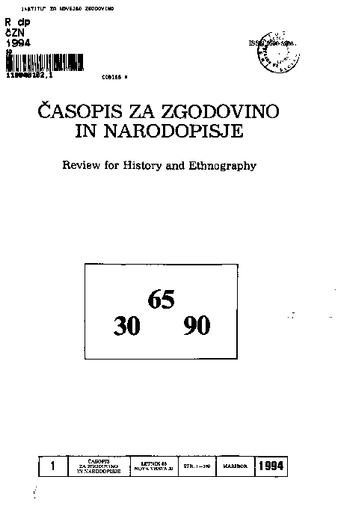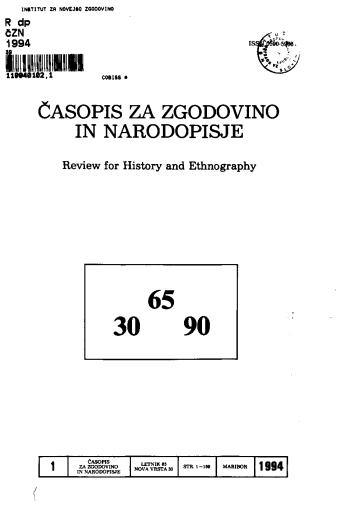
/
Periodicals
/
Časopis za zgodovino in narodopisje
Yugoslavia — an historical mistake or exigency?

Author(s):Vasilij Melik
Co-author(s):Marjan Žnidarič (ur.)
Leto:1994
Publisher(s):Založba Obzorja, Maribor, Izdajata Univerza v Mariboru in Zgodovinsko društvo Maribor
Language(s):slovenščina
Type(s) of material:text
Rights:

This work by Vasilij Melik is licensed under Creative Commons Attribution-NonCommercial-NoDerivs 4.0 International
Files (1)

Name:1994_1_Casopis_za_zgodovino_in_narodopisje.pdf
Size:2.77MB
Format:application/pdf
Permanent link:https://hdl.handle.net/11686/file2541
Description
The author stresses, that the majority of Slovens, before 1918, imagined Yugoslavia as an independent state without Serbia and Montenegro. He underscores, that Slovenian politicians had, at the time of the end of World War I, been so disoriented and uninformed, that they were mostly able only to follow events, wherever they took them. The fear of national extinction under
German supremacy, which is understandable, was also present, but it does not justify the lack of knowledgeability of Yugoslav nationalities, their customs, mentality and political methods. There had been sufficient time for our politicians to have acquired the necessary information on close-by and distant Yugoslavs.
Metadata (12)
- identifierhttps://hdl.handle.net/11686/8196
- title
- Jugoslavija - zgodovinska zmota ali nuja?
- Yugoslavia — an historical mistake or exigency?
- creator
- Vasilij Melik
- contributor
- Marjan Žnidarič (ur.)
- subject
- slovenska zgodovina
- Jugoslavija
- Slovene history
- Yugoslavia
- description
- The author stresses, that the majority of Slovens, before 1918, imagined Yugoslavia as an independent state without Serbia and Montenegro. He underscores, that Slovenian politicians had, at the time of the end of World War I, been so disoriented and uninformed, that they were mostly able only to follow events, wherever they took them. The fear of national extinction under German supremacy, which is understandable, was also present, but it does not justify the lack of knowledgeability of Yugoslav nationalities, their customs, mentality and political methods. There had been sufficient time for our politicians to have acquired the necessary information on close-by and distant Yugoslavs.
- Avtor poudarja, da si je večina Slovencev leta 1918 predstavljala Jugoslavijo kol samostojno državo brez Srbije in Črne gore. Poudarja, da so bili slovenski politiki ob koncu vojne tako neorientirani in neinformirani, da so večinoma mogli samo še slediti dogodkom, kakor je pač naneslo. Tudi strah pred narodno smrtjo pod nemško premočjo, ki je razumljiv, ne opravičuje nepoznavanja slovanskih in jugoslovanskih narodov, njihovih navad, mentalitete in političnih metod. Časa za to, da bi si naši politiki nabrali dragocenih informacij o bližnjih in daljnih Jugoslovanih, je bilo dovolj.
- publisher
- Založba Obzorja
- Izdajata Univerza v Mariboru in Zgodovinsko društvo Maribor
- date
- 1994
- type
- besedilo
- language
- Slovenščina
- isPartOf
- rights
- license: ccByNcNd
Citirano v (2)
| Tipologija | Avtor(ji) | Naslov | Kraj | Založba | Leto |
|---|---|---|---|---|---|
| 1.01 Izvirni znanstveni članek | Rahten, Andrej | Slovenske narodnoemancipacijske težnje v postimperialni tranzicijski dobi | Koper ; Milje | Zgodovinsko društvo za Južno Primorsko | 2021 |
| 1.01 Izvirni znanstveni članek | Dolenc, Ervin | Slovensko zgodovinopisje o obdobju 1918-1991 po razpadu Jugoslavije | Ljubljana | Inštitut za novejšo zgodovino | 2004 |